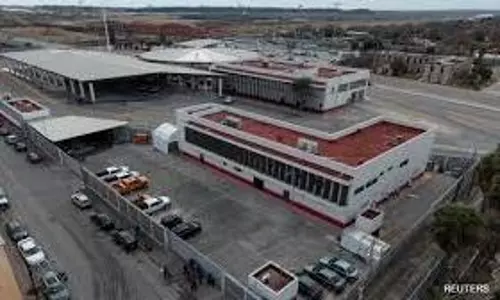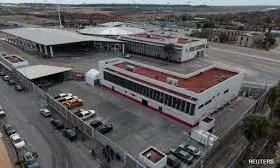
Mexico prepares temporary shelters for mass deportations from the U.S.
text_fieldsIn response to potential mass deportations under U.S. policies, Mexican authorities have begun constructing large temporary shelters in Ciudad Juarez to accommodate thousands of returning citizens.
The initiative aims to address the needs of deported Mexicans as part of a broader government strategy to support those repatriated.
Municipal official Enrique Licon announced that the shelters, consisting of giant tent structures, will be ready within days. Located near the Rio Grande, which separates Ciudad Juarez from El Paso, Texas, the shelters are part of a larger government plan spanning nine cities across northern Mexico.
The facilities will provide deported individuals with essential services, including food, temporary housing, medical care, and assistance with obtaining identity documents. The plan, titled "Mexico Embraces You," also includes deploying buses to transport people from reception centers to their hometowns.
The move comes as U.S. deportation policies, including the reinstatement of Migrant Protection Protocols (MPP), are expected to intensify. Nearly five million Mexicans currently reside in the U.S. without proper authorisation, according to El Colegio de la Frontera Norte (COLEF). Many of these individuals come from regions in central and southern Mexico plagued by violence and poverty, such as Michoacan, Guerrero, and Chiapas.
Authorities in Mexico face the dual challenge of preparing for an influx of deportees while grappling with limited resources and economic constraints. Interior Minister Rosa Icela affirmed the government’s commitment to allocating necessary resources to support repatriated citizens, but concerns remain about Mexico's capacity to manage such a large-scale operation.
Critics, including immigration advocates, have raised concerns about Mexico's readiness. Jose Luis Perez, a former migration official in Tijuana, publicly questioned the government's preparedness following the cancellation of programs like CBP One, which allowed some migrants waiting in Mexico to enter the U.S. legally. His subsequent dismissal from his role has drawn criticism.
The economic impact of mass deportations could also be significant, with remittance-dependent communities across Mexico facing financial strain. Wayne Cornelius, professor emeritus at the University of California-San Diego, warned that the loss of remittances could lead to serious disruptions in local economies.
In Ciudad Juarez, soldiers worked late into the night assembling the shelters, including an industrial kitchen to serve deported individuals. The site, located near a landmark where Pope Francis held a 2016 open-air Mass for migrants, symbolises the humanitarian focus of the initiative. However, as deportation policies evolve, Mexico faces mounting pressure to ensure its northern border cities can handle the expected surge in returning citizens.























